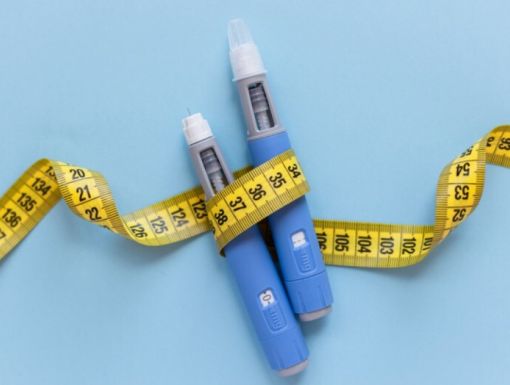
14 Ways to Kickstart Your Weight-Loss Journey
Many factors contribute to and affect weight loss. Changing your lifestyle does take effort, and every step forward brings you closer to your goals. Here are 14 tips to help you get started on your weight-loss journey.
1. Measuring correctly
Most people check their weight by stepping on a scale, but that doesn’t tell the whole story. Your weight can change slightly depending on what you eat, your hormones or how much water your body is holding.
Muscle weighs more than fat, so if you’ve started working out, you might not see your weight drop right away. If your weight isn’t changing, checking your body mass index (BMI) won’t help much. Since BMI is based only on height and weight, and your height stays the same, your BMI won’t change either.
A better way to track progress is to measure your waist or check your body fat percentage. Some home scales can measure body fat, which gives a clearer picture of how your body is changing. Also, pay attention to how your clothes fit. Sometimes, that tells you more than the scale ever could.
2. Make sure you are eating enough
It’s a common misconception that losing weight simply means eating less, but this approach can be counterproductive. Drastically cutting calories can trigger your body’s survival instincts, causing it to conserve energy and slow your metabolism. The American Obesity Association recommends creating a manageable calorie deficit. A calorie deficit is when you burn more calories than you consume. Going beyond this can lead to what’s known as “starvation mode,” making it harder to achieve sustainable weight loss.
Instead of cutting out foods, try replacing them with healthier options. Eating the right foods in the right amounts is important because your body needs different types of nutrients. Cutting out carbs or fats completely isn’t a good idea. Your body needs a balance of fats, proteins and whole grains.
3. Eat a balanced diet throughout the day
You don’t want to starve yourself, but you also need to avoid overeating. Eating small portions throughout the day may not be the best approach. Instead, it’s better to have three balanced meals. You can also track what and how much you eat.
In addition to what you eat, when you eat can be just as important. Studies show that eating most of your calories earlier in the day, rather than later, can help with weight loss. For example, eating most of your calories at dinner instead of earlier in the day can lead to less weight loss, even if your total daily calories are the same.
4. Plan your meals and snacks, or use an app to stay on track
Many people would be surprised by how many calories they eat in a day if they’ve never tracked them before. Snacking can add a lot to your total daily intake and can undo efforts to eat less at main meals. Many apps are available to track calories and can give you a better idea of how much you’re eating.
Speaking of staying on track with your eating habits, it’s important to be mindful about food. Eating should be treated as an event, not just something you do. You’d be surprised how easily snacks sneak into your daily routine. Sometimes, it’s the snacks you buy at the convenience store when you’re a little hungry or the tin of cookies in the breakroom.
Plan your meals and snacks throughout the day. Take your time while eating so you are more aware of what you’re consuming.
5. Eat more whole foods
Processed food is often the biggest problem when it comes to weight loss. Processed foods include anything that has been cooked, canned, frozen, or packaged. Eating ultra-processed foods can increase the risk of obesity compared to eating healthy foods with the same amount of calories. These foods can mess with your body’s natural hunger signals, making you feel less full after eating or making you feel hungry sooner than if you ate healthier foods.
Try adding more whole foods to your diet, such as fruits, vegetables, whole grains, nuts and legumes. These foods are also more filling and will keep you satisfied longer.
6. Mix it up
Variety is the spice of life, and if you want to lose weight, you need to spice up your meal plan. Just because a meal plan has been helping you lose weight doesn’t mean it will continue to do so. Eventually, your weight loss will plateau because your body has become used to your meals.
Eating the same thing over and over also becomes boring and might lead you to crave unhealthy options. Besides, who wants to eat chicken and broccoli every single day?
7. Focus on diet as much as exercise
One of the most common mistakes people make when starting their weight loss journey is focusing too much on exercise and not enough on diet. Research shows that weight loss is about 80% diet and 20% exercise. Exercise alone isn’t enough.
Exercise and a healthy diet go hand in hand. You can’t expect to lose weight without addressing both. While exercising burns calories, it can also make you hungrier, sometimes causing you to eat more than you would have without exercising. This can cancel out the benefits of the extra activity. It can also lead people to treat themselves to more food, thinking they can afford it because they exercised.
You may think that running on the treadmill for an hour cancels out the fast food you had for dinner. Unfortunately, your body doesn’t work that way. To lose weight, you need both a healthy diet and a consistent fitness routine. Going to the gym three to five times a week and doing both cardio and strength training is great, but if you’re not eating well, you won’t see results.
8. Get up and move
Leading a sedentary lifestyle will not help you lose weight. This can be challenging for people with desk jobs or jobs where they don’t get the chance to move around.
The best thing you can do in this case is take a five- to 10-minute break every hour to stretch and move around. Going for short walks during breaks or your lunch hour can also help. You can also park farther away or take the stairs whenever possible. If it’s too hard to tear yourself away from your desk, make sure you get some exercise in the evenings.
9. Stick to no or low-calorie beverages
Another sneaky culprit sabotaging your weight-loss goals may be the drinks you consume. Drinks like iced mochas, soft drinks, juices, smoothies and even drinks marketed as healthy beverages are packed with sugar.
What you drink is just as important as what you eat. While you’re at it, make sure to limit your alcohol consumption. Most alcoholic beverages are loaded with calories. Your best bet is to stick with water.
10. Consider how your medications or medical condition might affect weight loss
The medications you take or a medical condition can also affect your ability to lose or gain weight. If you have a condition like hypothyroidism, it’s important to speak with your doctor to see what can be done to help you stay healthy.
It’s also a good idea to ask questions regarding any medications you may be taking to see if there are alternative options.
11. Manage your stress
Stress affects your mood and can cause you to make poor decisions. We’ve all heard the term “stress eating,” which is when we eat to feel better.
For many, eating is an enjoyable experience, but the pounds can add up quickly if we misuse that sense of pleasure. Stress can also lead to unhealthy eating habits, like grabbing fast food instead of preparing a nutritious meal.
Planning your meals and prepping your ingredients ahead of time can help you power through weeknight dinners and stay on track. Everything is okay in moderation. It’s fine to have some ice cream after a bad day — just don’t eat an entire pint in one sitting.
12. Get enough sleep
Getting enough sleep is just as important for weight loss as exercise and diet. Sleep deprivation can slow down your metabolism, making it harder to lose weight. Lack of sleep, including poor-quality sleep, affects hunger hormones, which increases your appetite the next day. It also raises cortisol (the stress hormone), which can further increase appetite and fat storage.
Like stress, lack of sleep can lead to poor health choices. One common cause of poor sleep, obstructive sleep apnea, often goes unnoticed when looking at the reasons for weight gain or the lack of weight loss. This condition creates a cycle where the lack of sleep from sleep apnea causes weight gain, and the weight gain worsens the sleep apnea. Make sure to get eight hours of sleep each night to be well-rested and ready to take on the day.
13. Understand how biological factors affect weight loss
When you gain weight and stay at that weight for a while, your body tries to keep that weight as the “new normal.” It does this in two ways. First, your body becomes more efficient, meaning it burns fewer calories during physical activity. So, even if you lose weight, you won’t burn as many calories as someone who has never been overweight, even if you both have the same activity level.
The second way your body defends a higher weight is by changing hunger hormones. When you try to lose weight, your body increases hunger hormones and lowers hormones that tell you you’re full, making you feel hungrier and causing you to eat more. This process is like a one-way ratchet: once the weight is gained, it’s hard to fully “reset” your body back to a lower weight.
This is why weight loss can be difficult, especially for people who have been overweight for a long time. It’s also why GLP-1/GIP medications are helpful for some people — they block hunger hormones, which helps prevent weight regain.
In short, your body tries to keep you at your highest weight by burning fewer calories and making you hungrier. This is why focusing only on the “calories-in-calories-out” approach doesn’t give you the full picture of weight loss.
14. Set realistic expectations
Losing weight takes time, so you need to be realistic about your goals and timeframe. Rapid weight loss is usually associated with gaining the weight back.
When making fitness goals, make sure they are S.M.A.R.T.: specific, measurable, achievable, realistic, and timely. It’s also important to remember that every person’s body is different, so be patient with yourself.
Learn more about David Trahan, MD, and schedule an appointment.



